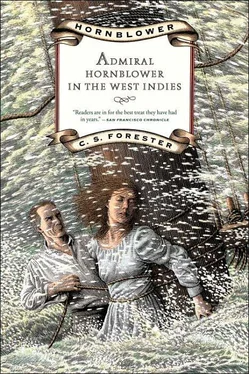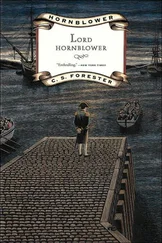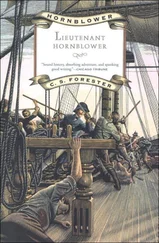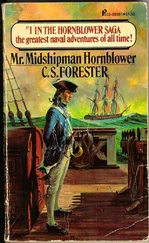“We’d have something better to eat than coconut jelly if we got those boxes up,” he said.
“I’ll have a go, sir,” said a young seaman, and Hornblower was inexpressibly relieved. He did not want to go down there himself.
“Good lad,” he said. “Put a line round yourself before you go down. Then we can haul you out if we have to.”
They were setting about their preparations when Hornblower checked them.
“Wait. Look for’rard!” he said.
There was a rain-squall a mile away. They could see it, a vast pillar of water to windward streaming down from the sky, well defined; the cloud was lower whence it fell, and the surface of the sea which received it was a different grey from the rest. It was moving down towards them—no, not quite. The centre was heading for a point some distance on their beam, as everyone could see after a moment’s study. There was an explosion of blasphemy from the grouped hands as they watched.
“We’ll get the tail of it, by God!” said the mate.
“Make the most of it when it comes,” said Hornblower.
For three long minutes they watched it approach. A cable’s length away it seemed to stand still, even though they could feel the freshening breeze around them. Hornblower had run to Barbara’s side.
“Rain,” he said.
Barbara turned her face to the mast, and bent down and fumbled under her skirt. A moment’s struggle brought down a petticoat, and she stepped out of it and did her best to wring the salt damp out of it as they waited. Then came a few drops, and then the full deluge. Precious rain; ten shirts and a petticoat were extended to it, wrung out, re-extended, wrung out again, until the wringings tasted fresh. Everyone could drink, madly, with the rain roaring about them. After two minutes of it Hornblower was shouting to the crew to fill the empty coconut shells, and a few men had sense and public spirit enough to wring their shirts into them before returning to the ecstasy of drinking again—no one wanted to waste a single second of this precious rain. But it passed as quickly as it came; they could see the squall going away over the quarter, as far out of their reach as if it were raining in the Sahara Desert. But the young hands of the crew were laughing and joking now; there was an end to their care and their apathy. There was not one man on board except Hornblower who spared a thought for the possibility, the probability, that this might be the only rain-squall to touch the ship for the next week. There was urgent need for action, even though every joint and muscle in his body ached even though his mind was clouded with weariness. He made himself think; he made himself rally his strength. He cut short the silly laughter, and turned on the man who had volunteered to venture down into the steerage.
“Put two men to tend your line. The steward had better be one of ‘em,” he said. “Mr. Mate, come for’rard with me. We want to get sail on this ship as soon as may be.”
That was the beginning of a voyage which was destined to become legendary, just as did the hurricane which had just passed—it was called Hornblower’s Hurricane, singled out not only because Hornblower was involved in it but also because its unexpected arrival caused widespread damage. Hornblower never thought that the voyage itself was particularly notable, even though it was made in a waterlogged hulk precariously balanced upon bales of coir. It was only a matter of getting the hulk before the wind; a spare jib-boom (the only spare spar surviving the storm) made a jury mast when fished to the stump of the foremast, and the sacking from coir bales provided sails. Spread on the jury foremast these enabled them to get the Pretty Jane before the trade wind, to creep along at a mile an hour while they set to work on extemporising aftersails that doubled her speed.
There were no navigating instruments—even the compass had been dashed from its gimbals during the storm—and on the first two days they had no idea where they were, except that somewhere to leeward lay the chain of the Antilles, but the third day proved fine and clear and dawn had hardly broken before a hand at the mainmast-head saw the faintest, tiniest dark streak on the horizon far ahead. It was land; it might be the high mountains of San Domingo far off, or the low mountains of Puerto Rico somewhat nearer; there was no knowing at present, and even when the sun had set they were still ignorant—and they were thirsty, with small appetite for the meagre ration of corned beef that Hornblower doled out to them from the recovered stores.
And despite fatigue they could sleep that night on their coir mattresses on the deck that an occasional small wave still swept. Next morning the land was nearer still, a low profile that seemed to indicate it might be Puerto Rico, and it was in the afternoon that they saw the fishing boat. It headed for them, puzzled at the strange vessel bearing down upon it, and it was not long before it was alongside, the mulatto fishermen staring at the group of strange figures waving to them. Hornblower had to urge his dazed mind, stupid with lack of sleep and fatigue and hunger, to remember his Spanish as he hailed them. They had a breaker of water on board, and they had a jar of cold garbanzos as well; there was a can of corned beef to add to the feast. Barbara caught, even though she spoke no Spanish, two words of the excited conversation that went on.
“Puerto Rico?” she asked.
“Yes, dear,” said Hornblower. “Not very surprising—and much more convenient for us than San Domingo. I wish I could remember the name of the Captain-General there—I had dealings with him in the affair of the Estrella del Sur. He was a marquis. The Marques de—de—Dearest, why don’t you lie down and close your eyes? You’re worn out.”
He was shocked anew at her pallor and look of distress.
“I’m well enough, thank you, dear,” replied Barbara, even though the strained tone of her voice denied her words. It was one more proof of her indomitable spirit.
It was when they were discussing what to do next that the second mate showed the first sign of any spirit. They could all desert the waterlogged hulk and sail into Puerto Rico in the fishing boat, but he stoutly refused to do so. He knew the law about salvage, and there might be some value still in the poor hull, and certainly in its cargo. He would work the Pretty Jane in tomorrow himself, and he insisted on staying on board with the hands.
Hornblower faced a decision of a sort he had never yet encountered in a varied career. To leave the ship now savoured of desertion, but there was Barbara to think of. And his first reaction, that he would not dream of deserting his men, was promptly ended by his reminding himself that they were not ‘his men’ at all.
“You’re only a passenger, My Lord,” said the mate—it was odd how ‘My Lord’ seemed to come naturally again now that they were in touch with civilisation.
“That’s so,” agreed Hornblower. Nor could he possibly condemn Barbara to another night on the deck of this waterlogged hulk.
So they came sailing into San Juan de Puerto Rico, two years after Hornblower had last visited the place in very different circumstances. Not unnaturally their arrival set the whole place in an uproar. Messengers sped to the Fortaleza, and it was only a few minutes later that a figure appeared on the quay which Hornblower’s swimming eyes contrived to recognise, tall and thin, with a thin moustache.
“Mendez-Castillo,” he said, saving Hornblower any further trouble about remembering his name. “It grieves me greatly to see Your Excellencies in such distress, even while I have much pleasure in welcoming Your Excellency again to Puerto Rico.”
Some sort of formalities had to be observed, even in these conditions.
Читать дальше











